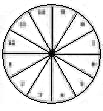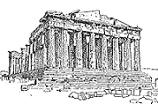
"The placement of the celestial bodies in the heavens at any given moment in time reflects the nature of that moment, including the nature of an individual born in that moment."

The roots of Western astrology can be traced back to the Middle East 4000 B.C.E - 125 B.C.E. There was a region once known as Mesopotamia which consisted of Babylonia and Assyria. The ancient settlers known as the Sumerians studies the sky and began to notice a connection between the heavenly cycles and the plant and food growth. The Sumerians placed importance on three deities which were known as Sin the moon god, Shamash the sun goddess, and Ishtar the goddess of Fertility whose home was the bright star Venus. As in most early cultures the astrologers were the religious priests who were also leaders of government. They built large observatories known as Ziggurats in order to study the movements of the stars and planets. The famous Tower of Babel is sometimes described as a Ziggerat.
From 2800 B.C.E up until 500 B.C.E Astrology became more sophisticated. The planets Mercury, Mars, Jupiter and Saturn has been discovered. Each of these planets were also given certain characteristics and a god was assigned to each. Mars was a fiery planet associated with war, Venus was a feminine planet associated with love and fertility. The four seasons were also given symbolic meaning. Spring was the bull, summer a lamb, autumn a scorpion and winter a turtle. The characteristics of Mars and Venus, and the astrological sign of the Bull and the Scorpion are still used today.
Among the sciences, astronomy and astrology played a very important role in ancient Babylonian society. The modern Zodiac was created by the Babylonians and the astrologer-priests first set out the basic principles of astrology that remain unchanged to this day. The sky was divided into twelve equal parts through which the sun and moon traveled. These twelve divisions may also represent each month of a lunar cycle and the twelve months of the Babylonian year. The circle of the sky was 360 degrees and each division was 30 degrees. The twelve divisions or signs were given the names : Aries, Pleiades, Gemini, Praesepe, Leo, Spica, Libra, Scorpio, Sagittarius, Capricornus, Aquarius, and Pisces. The Greeks later changed Pleiades to Taurus, Praessepe to Cancer, and Spica to Virgo. Each sign has an influence over particular events on earth. Each rules an animal, plant, a precious stone, and a color.
 The Babylonians were also the first to name the 12 houses. which are divisions of the zodiac that govern various aspects of life.
During this time astrology was mainly used to predict weather forecasts, floods, harvests, eclipses, war times, and fortunes of the king. It is around 400 B.C.E - 200 B.C.E that a person's individual horoscope was focused upon.There are a few horoscopes cast during time that are still in existence.
The Babylonians were also the first to name the 12 houses. which are divisions of the zodiac that govern various aspects of life.
During this time astrology was mainly used to predict weather forecasts, floods, harvests, eclipses, war times, and fortunes of the king. It is around 400 B.C.E - 200 B.C.E that a person's individual horoscope was focused upon.There are a few horoscopes cast during time that are still in existence.
In Babylonian Astrology the constellation Cassiopia was called "woman with child" because every 300 years it produced an unusually bright star. This star ruled over the lands of Palestine and Syria. It may be the star that the Three Wise Men followed to the manger where Jesus was born because it was bright in the sky at that very time. The Jewish people of that era also practiced astrology. The word "Mazel Tov" has it's roots in astrology. Derived from the biblical Hebrew word Mazelot" which means "sign of the zodiac" or "constellation".
 Around 900 B.C.E to A.D 150 The Greeks began making use of astrology. They gave names to the five observable planets which were Venus, Mars, Mercury, Jupiter and Saturn. The early Egyptians who had originally divided the sky into 36 sections were called "Dekanoi" (10 degrees each) to the Greek. This is where we get the word Decan or Decanate and the original 36 are still be used today.
Around 900 B.C.E to A.D 150 The Greeks began making use of astrology. They gave names to the five observable planets which were Venus, Mars, Mercury, Jupiter and Saturn. The early Egyptians who had originally divided the sky into 36 sections were called "Dekanoi" (10 degrees each) to the Greek. This is where we get the word Decan or Decanate and the original 36 are still be used today.
Around 600 BC the philosopher Pythagoras believed the universe was a giant sphere that contained the earth and other celestial bodies and the "air" around it. The word "planet" is comes from the Greek word planetes which means "wanderer". 200 years later in 400 BC the Greek mathematician and astronomer Eudoxos was the first to explain the movements of the planets in more scientific terms. He introduced a new calendar based on the Babylonian one, also divided into 12 equal sections or signs.
When Alexander the Great (who often consulted astrologers himself) conquered Babylonia in 331 B.C.E the Greeks took over Babylonian astrology. They gave the 5 planets new names taken from their own mythological gods.
As astrology further developed in Babylonia while under Greek influence, it's scope was enlarged and eventually brought into connection with practically all of the known sciences: botany, chemistry, zoology, mineralogy, anatomy and medicine. Colors, metals, stones, plants, drugs and animal life of all kinds were each associated with one or another of the planets and placed under their rulership. Astrology played an important part in Medieval medicine. The most educated physicians were trained in at least the basics of astrology to use in their practice.
 Caludius Ptolemy was a Greek astronomer who is considered the father of modern astrology. His observations were developed into theories of the universe which he wrote about in TheTetrabiblos, considered the first modern textbook on astrology. Ptolemy described the functions and meanings of the planets, houses and signs of the zodiac. He also introduced the theory of "aspects" which are still used today and are a very important part of an astrological chart.
Caludius Ptolemy was a Greek astronomer who is considered the father of modern astrology. His observations were developed into theories of the universe which he wrote about in TheTetrabiblos, considered the first modern textbook on astrology. Ptolemy described the functions and meanings of the planets, houses and signs of the zodiac. He also introduced the theory of "aspects" which are still used today and are a very important part of an astrological chart.
 Astrology became of great interest to the Romans around 300 B.C.E - A.D 476 when it was first introduced to them by their Greek slaves. Almost every Roman authority had personal astrologers and Horoscopes were often studied in order to make predictions about military rivals and to have an advantage during war. Notable figures who used astrology include Cleopatra and Marc Antony, Julius Caesar, Tiberius, Nero and Hadrian to name a few. The Romans also renamed the Greek planets again according to corresponding name of their roman gods. The Roman names for these planets are currently the ones used in the west today.
Astrology became of great interest to the Romans around 300 B.C.E - A.D 476 when it was first introduced to them by their Greek slaves. Almost every Roman authority had personal astrologers and Horoscopes were often studied in order to make predictions about military rivals and to have an advantage during war. Notable figures who used astrology include Cleopatra and Marc Antony, Julius Caesar, Tiberius, Nero and Hadrian to name a few. The Romans also renamed the Greek planets again according to corresponding name of their roman gods. The Roman names for these planets are currently the ones used in the west today.
After the fall of the roman empire the use of astrology began to diminish. It was at this time around A.D 354 - A.D 430 that Christianity became widespread and astrology was considered the work of the devil and was linked to superstition. Although there was little astrology being practiced in Europe at this time, the Arab world still considered astrology to be a serious science.
 The History of Astrology
The History of Astrology
 The Origins of Eastern Astrology
The Origins of Eastern Astrology
 [The Origins of Western Astrology]
[The Origins of Western Astrology]
 The Origins of Modern Astrology
The Origins of Modern Astrology
 Astrology and Astronomy
Astrology and Astronomy